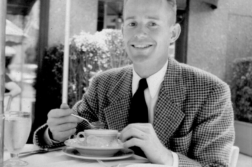I AWOKE one morning in January to a message from my friend Roy in England that just said, “Sad day for music.” A sense of dread welled up. I know that I am likely to witness the passing of Bob Dylan, Joni Mitchell, and Patti Smith. What will the world be like without them? For the moment we share the same sunlight and oxygen supply. When there is a lunar eclipse, I know that Paul McCartney and Toni Morrison are looking at it, too. I know there’s a chance that I could bump into Smokey Robinson or Elton John getting coffee in an airport somewhere in the world.
But not David Bowie. He is gone so unexpectedly. I was in New York City that weekend waiting to get Blackstar, his heralded new album, the beginning of the next phase of Bowie in our lives. Would there be a tour? Would I get a new haircut to look like him (again)? I should have found him on his deathbed there in Manhattan to thank him. A kiss on his alien eyelids.
For those of us who came of age in the 1970s, Bowie was more than a “rock star.”
That was the beginning of my wanting to grow my hair long. Endless battles with my mother (“Boys with long hair are all on drugs!”) and father (“Why would you want to look like a girl?”). In rural Georgia, if word got around that you were a Bowie fan, people would say, “You must be AC-DC like him!” I didn’t really care. The music came from someplace magical. His self-declared bisexuality created a safe zone for us as we engaged in our own space exploration. My sexuality was never an issue. The sanity of the world I expressed it in was.
All of us misfit kids had Bowie. Before punk roared in, we had Bowie to speak for us and to tell us we were wonderful. “Rock and Roll Suicide” must be an anthem for so many young people who feel zero validation from the straight world. It’s a reason to reject suicide as an option: “Oh no love! you’re not alone/ No matter what or who you’ve been/ No matter when or where you’ve seen/ All the knives seem to lacerate your brain/ I’ve had my share, I’ll help you with the pain/ You’re not alone.”
Bowie always defined gender nonconformity: wearing makeup, dying his hair, wearing a skirt on Saturday Night Live. In a culture obsessed with a simple gender binary, what could be more rebellious than that? For all of us kids who didn’t quite fit into the butch boy/femme girl box, we had permission to mix and match and create something completely new.
My first sociology professor at Oxford College, who radicalized me in so many ways, had a blind spot around queer issues. I remember him trying to make the case that we are all sexual but socialized to be heterosexual, and if that process gets messed up, we end up confused, “like David Bowie.” I remember thinking, Wait, that’s not right. Bowie is just rebelling against social constructions of gender. He knows exactly what he’s doing.
I have every piece of music that Bowie has released. I have B sides and oddities. Have you heard the soundtrack to The Buddha of Suburbia (1993)? You should. I’ve seen him in concert several times. My favorite moment was at Live Aid in London in 1985. I was front-right for the global event. I should mention that I really hated Bowie’s Let’s Dance album when it came out in 1983. It was such a commercial piece of fluff compared to 1980’s Scary Monsters. So I was supremely bummed when he opened with “Modern Love,” my least favorite Bowie song. But then he played “Heroes,” and it could not have been more perfect. We were there trying to feed the world, just for one day. There were tears everywhere. Bowie transformed us.
He transformed us many times. He made being smart and aging into your sixties look really cool, and he never stopped playing with our weird obsession with gender roles. Now that he’s dead, everybody will claim him as their own. A lot has been written about the Thin White Duke as a “chameleon” and all the ch-ch-changes he went through, the movies he made, and the fashions he inspired. I just think about us kids who didn’t fit in, who got to feel that we had a very special space boy on our side.
Randy Blazak is a sociologist on the faculty of the Univ. of Oregon.




